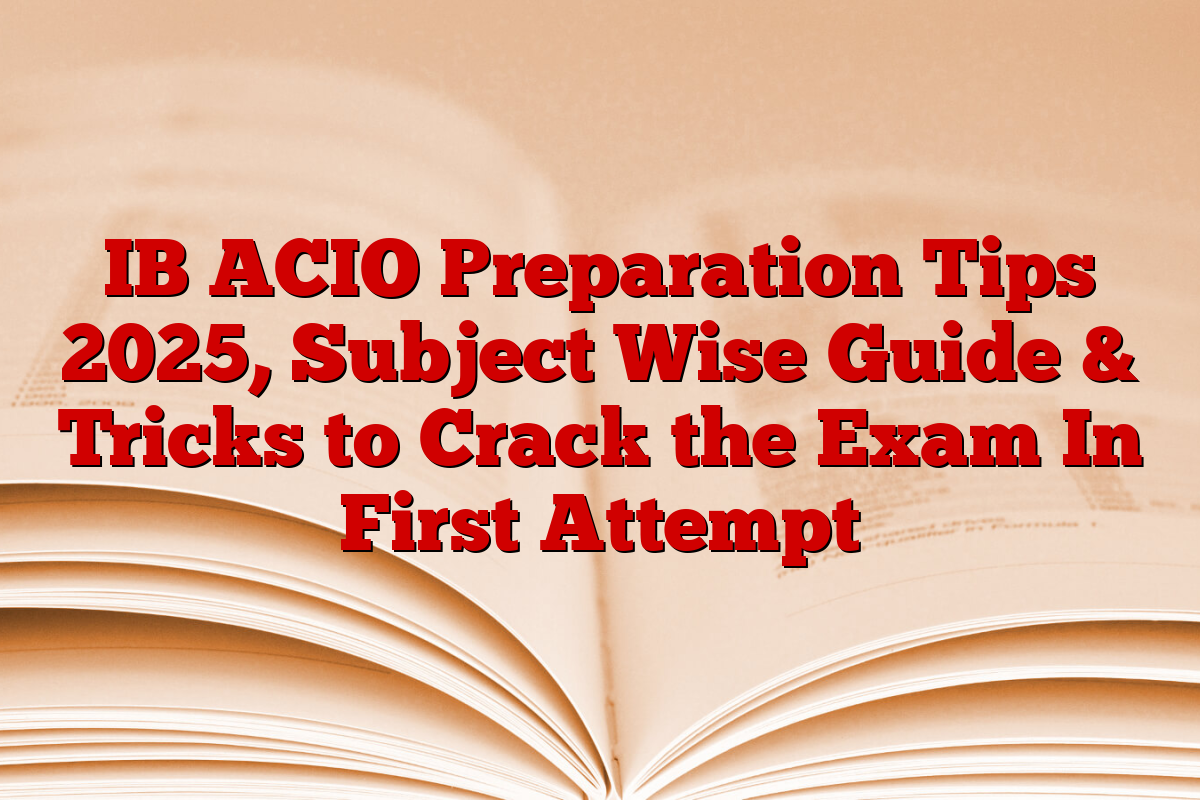The Intelligence Bureau has issued a notification of Assistant Central Intelligence Officer, and this is the best time to prepare for this post. A total of 3717 vacancies have been announced for the post of executive this year. Interested candidates can apply for this post and now start their preparation with IB ACIO Preparation Tips 2025.
The Intelligence Bureau conducts the IB ACIO recruitment process in three stages: a purpose test (Tier 1), a descriptive test (Tier 2), and a personal interview. Candidates begin their journey with Tier 1, which is an objective-type examination including five major topics current affairs, general studies, numerical qualifications, logical qualifications and English language.
IB Acio Tier 1 Exam Pattern
Tier 1 Objective Test assesses candidates in five different subjects: Current Affairs, General Studies, Numerical Qualification, Logic/Logical Qualification and English Language. Each section usually consists of 20 questions, which make a total of 100 questions for 100 marks, to complete within 60 minutes. An important aspect to remember is negative marking of 1/4th mark for each wrong answer.
Subject-wise preparation strategies for ib acio tier 1 2025
To maximize your score and ensure comprehensive preparation, consider the following topics tips:
Topic
This section is about being updated with recent events.
- Create a daily hobbit: Make a habit of connecting with national and international news every day. Focus on important events, government policies, economic development, scientific successes, sports achievements and major awards.
- Miscellaneous sources: Do not limit yourself to a news source. Explore various reputed newspapers, online news portals and menstrual current affairs magazines. This makes your outlook wider and ensures wide coverage.
- Strategic demonetisation: Instead of reading only, create a brief note actively. Classes events, dates, names and major facts. Consider using a digital tool or a dedicated notebook for quick modification. Give priority to subjects which are prominent for the last 6-8 months.
- Regular Quizing: Test your knowledge often through online quiz and current affairs sections in mock tests. This helps identify areas where you need more attention.
general Studies
General studies include history, geography, Indian politics and constitution, economy and a huge courses including Finance, Science and Technology (Physics, Chemistry, Biology) and static GK.
- Concept clarity: For subjects like Indian politics, history and geography, give priority to understanding fundamental concepts rather than rotten memoir. Connect events and policies to their widespread implications.
- Ncert foundation: For a strong base in science, history and geography, see the NCERT textbooks again from class 6 to 12. These books present information clearly and accessible.
- Strategic classification: Break static GK in managed categories such as important national symbols, famous personalities, important dates, international organizations and major physical characteristics.
- Mind Maps and Flocharts: Imagine complex information through Mind Maps and Flocharts. It helps in better retention and memory, especially for complex subjects.
- Last year’s trends: Analyze the previous year’s questions to understand the questions given to various sub-topics within general studies and the types of weightage.
Numerical qualification
This section tests your mathematical capacity, covers topics such as number systems, percentage, ratio and ratio and ratio, profit and loss, time and work, time, speed and distance, average, mensuration, simple and compound interest and data interpretation.
- Mastery in Fundamental: Before trying complex problems, ensure basic mathematical operations, formulas of formulas and concepts.
- Daily Practice Drill: Dedicate a specific time each day to solve different types of quantitative ability problems. Pay attention to improvement in both accuracy and speed.
- Shortcut technique: Learn and practice mental mathematics techniques and shortcut formulas to save time during the exam. However, make sure that you understand the underlying argument only before relying on the shortcut.
- Data interpretation focus: Practice a variety of data interpretation sets (table, bar graph, pie chart, line graph) to improve your ability to quickly analyze and interpret data.
- error analysis: After practicing, review your wrong answers completely. Identify the root cause of error. It was an ideological mistake, a calculation error, or a time management problem.
Logic/logical qualification
This section evaluates your logical thinking and skills to solve the problem, including blood relations, coding-decoding, series, analogy, seating arrangements, puzzles, direction sense and sillogism.
- Diversity of Puzzle: Attach with a wide range of logical puzzles, not only from previous exams. This enhances your common problem-solution and important thinking abilities.
- Visual and diagram: For questions like blood relations or seating arrangements, actively draw diagrams or make visual representations. This can simplify complex relationships.
- pattern recognition: Many logic questions revolve around the identity of the pattern. Practice it and develop your ability to recognize such patterns quickly.
- Periodic practice: Practice questions of logic in time bound circumstances to simulate the environment of the examination and improve your speed and efficiency.
- Pay attention to logic: Logic means applying logical principles, not missing the solution. Understand the logic behind different types of questions.
English language
Check your command on the English language including this section grammar, vocabulary and understanding. It contains reading understanding, synonyms and antonyms, filling spaces, error recognition, idioms and phrases, one-word replacement, sentence correction and sentence recurrence.
Grammar Foundation: Modify the fundamental grammar regulations (parts of speech, time, subject-action agreement, active-pass voice, direct-stake speech). Practice to identify and correct grammar errors.
vocabulary building: Make a habit of learning new words every day. Flashcard, use vocabulary app or create a dedicated vocabulary notebook. Pay attention to synonyms, antonyms and relevant use.
Active reading: Read the newspapers, articles and short stories regularly to improve your reading skills. Focus on understanding the main idea, identifying supporting details and drawing conclusions.
Practice passage: Work through the understanding of different types of reading. Pay attention to questions types (eg, direct questions, inferior questions, vowel of the path).
Fake Testing Analysis: Carefully analyze your performance in the English section of the mock test. Identify specific areas (eg, pre -groups, combinations, specific terminology types) where you make persistent mistakes and do extra practice.

